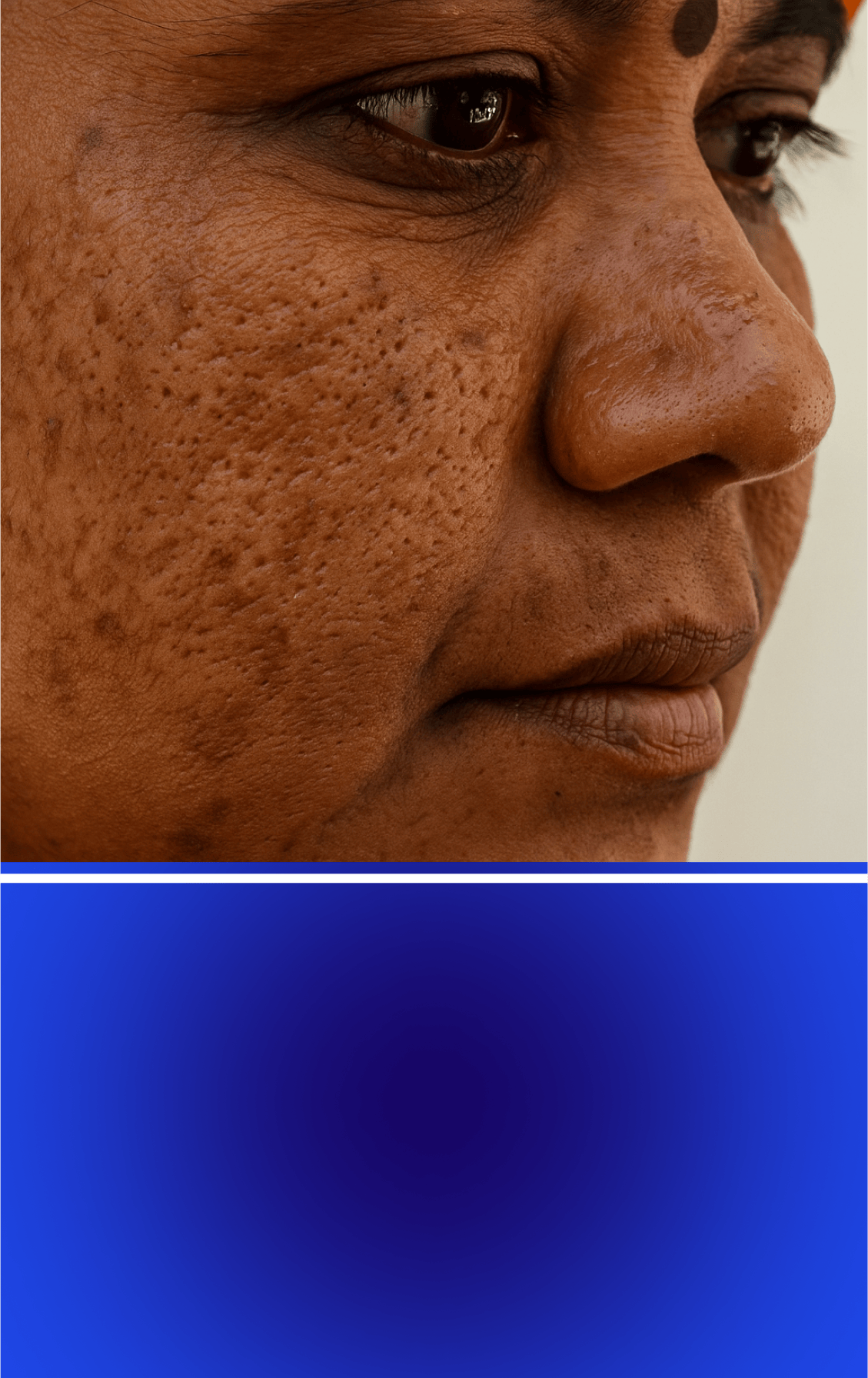Eczema is a chronic skin condition marked by dry, itchy, and irritated skin that can disrupt daily comfort, sleep, and self-confidence. From relentless itching to visible inflammation, it can impact both physical health and emotional well-being.
Millions of people worldwide live with eczema, but many delay diagnosis, hoping it will clear up on its own. Early intervention, however, can make a significant difference in managing symptoms and preventing flare-ups. In this article, we’ll walk you through eczema symptoms, causes, and treatment options in clear, practical terms so you can make informed decisions about your skin health.
Overview:
- Definition: Chronic skin inflammation causing dryness, redness, and itching.
- Common Age Group: Mostly children, but it can affect all ages.
- Main Causes: Genetics, immune response, environmental triggers.
- Types: Atopic, contact, dyshidrotic, nummular, seborrheic, stasis.
- Treatments: Moisturisers, topical meds, phototherapy, biologics.
- Prevention: Hydration, trigger avoidance, gentle skincare.
What is Eczema?
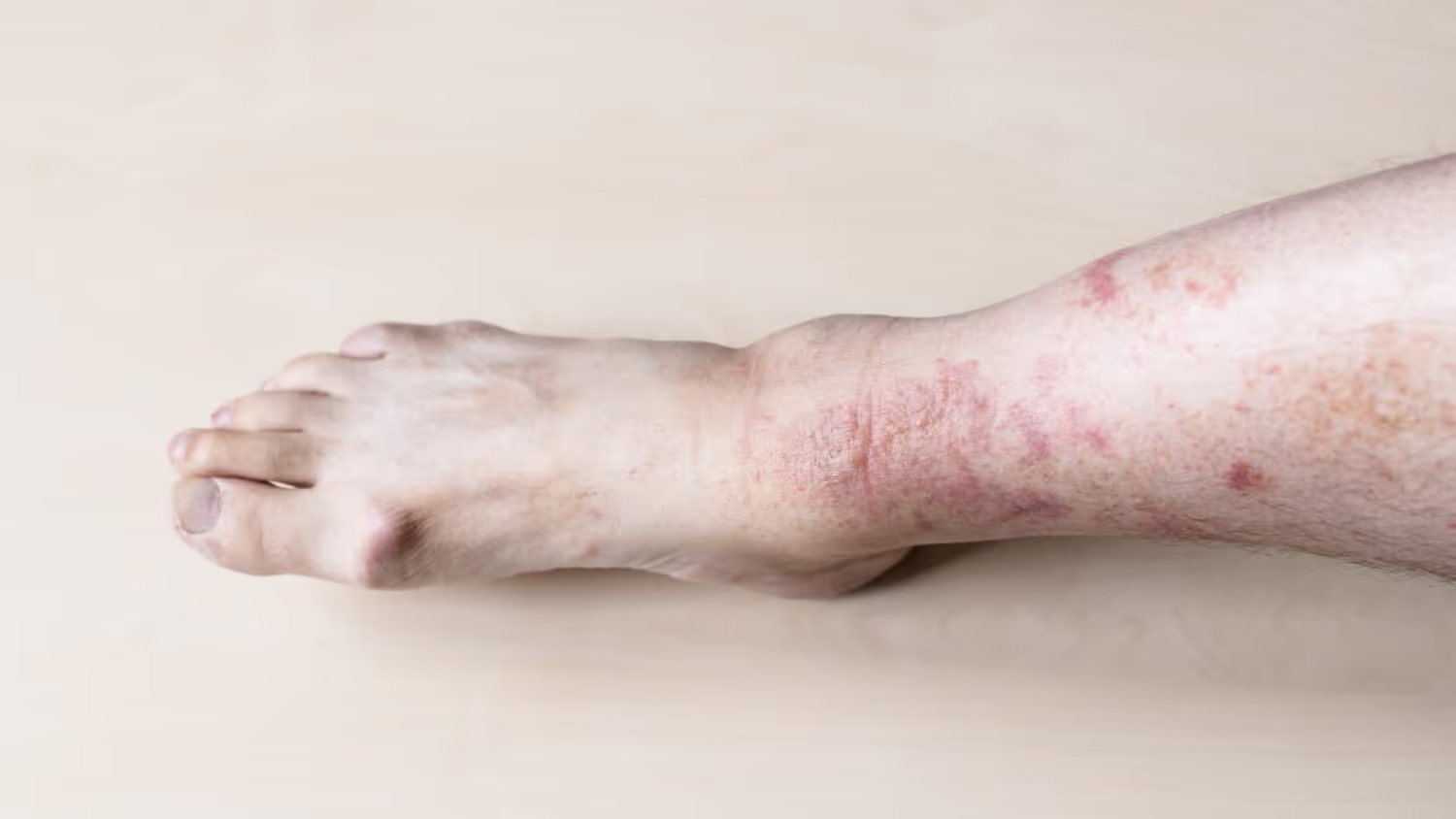
Eczema is a common, chronic skin condition marked by inflammation that causes dry, itchy, and irritated skin. It happens when the skin’s natural barrier is compromised, losing moisture and allowing irritants, allergens, or bacteria to penetrate more easily. This leads to redness, swelling, and persistent discomfort that can flare up unpredictably.
Common Types of Eczema
Eczema isn’t just one condition but a group of related skin disorders, each with distinct triggers and symptoms:
- Atopic Dermatitis: The most frequent type, often linked to a family history of allergies, asthma, or hay fever. It typically appears in childhood but can affect adults, too.
- Contact Dermatitis: Caused by direct skin contact with irritants (like harsh soaps) or allergens (like nickel or fragrances), leading to localized redness and itching.
- Dyshidrotic Eczema: Characterized by small, fluid-filled blisters on the palms and soles, which can be intensely itchy and uncomfortable.
- Nummular Eczema: Identified by round, coin-shaped patches of irritated skin that can be very itchy and inflamed.
- Seborrheic Dermatitis: Often affects oily areas such as the scalp and face, causing flaky, yellowish scales and redness.
- Stasis Dermatitis: Develops from poor circulation, usually on the lower legs, leading to swelling, redness, and sometimes ulceration.
Now that we’ve covered what eczema is and the different forms it can take, let’s look at the common signs and symptoms so you can recognise them early and seek timely care.
Common Symptoms of Eczema
Recognizing the signs early can help you seek treatment before symptoms worsen. Eczema can show up in different ways depending on the individual and severity.
- Visible signs: Dry, red, scaly, or itchy patches on the skin.
- Sensations: Persistent itching, burning, or stinging that may worsen at night.
- Severity spectrum: Ranges from mild irritation to painful, severe flare-ups that can disrupt daily activities.
While these symptoms can be uncomfortable, understanding what’s causing them is key to preventing future flare-ups. That’s where identifying common triggers becomes important.
Common Causes and Triggers
A single factor doesn’t cause eczema; it often results from a mix of genetic, environmental, and lifestyle influences.
- Genetic factors: Family history of eczema, asthma, or allergies.
- Environmental triggers: Allergens like pollen, pet dander, mold, or skin irritants such as soaps, detergents, and synthetic fabrics.
- Lifestyle-related causes: Stress, poor sleep, or an unbalanced diet can worsen symptoms.
- Seasonal changes: Cold, dry winters or hot, humid summers may lead to flare-ups.
Once you understand what eczema looks and feels like, the next step is figuring out how doctors confirm the condition and choose the right approach for you.
Diagnosis: How Doctors Identify Eczema
Getting an accurate diagnosis is key to finding relief and preventing future flare-ups. Doctors use a mix of observation, medical history, and sometimes tests to confirm eczema.
- Medical history evaluation – Asking about your symptoms, flare-up patterns, and family history of skin conditions or allergies.
- Physical examination – Checking the affected skin areas for redness, dryness, and other tell-tale signs.
- Possible allergy or patch testing – Identifying specific allergens or irritants that might be causing or worsening symptoms.
Once the diagnosis is confirmed, treatment focuses on controlling symptoms, reducing flare-ups, and improving your skin’s health.
Treatment Options for Eczema
Eczema requires a multi-faceted approach since it varies widely between individuals. While there isn’t a permanent cure, combining medical treatments with consistent lifestyle adjustments helps control symptoms and reduce flare-ups effectively.
A. Medical Treatments
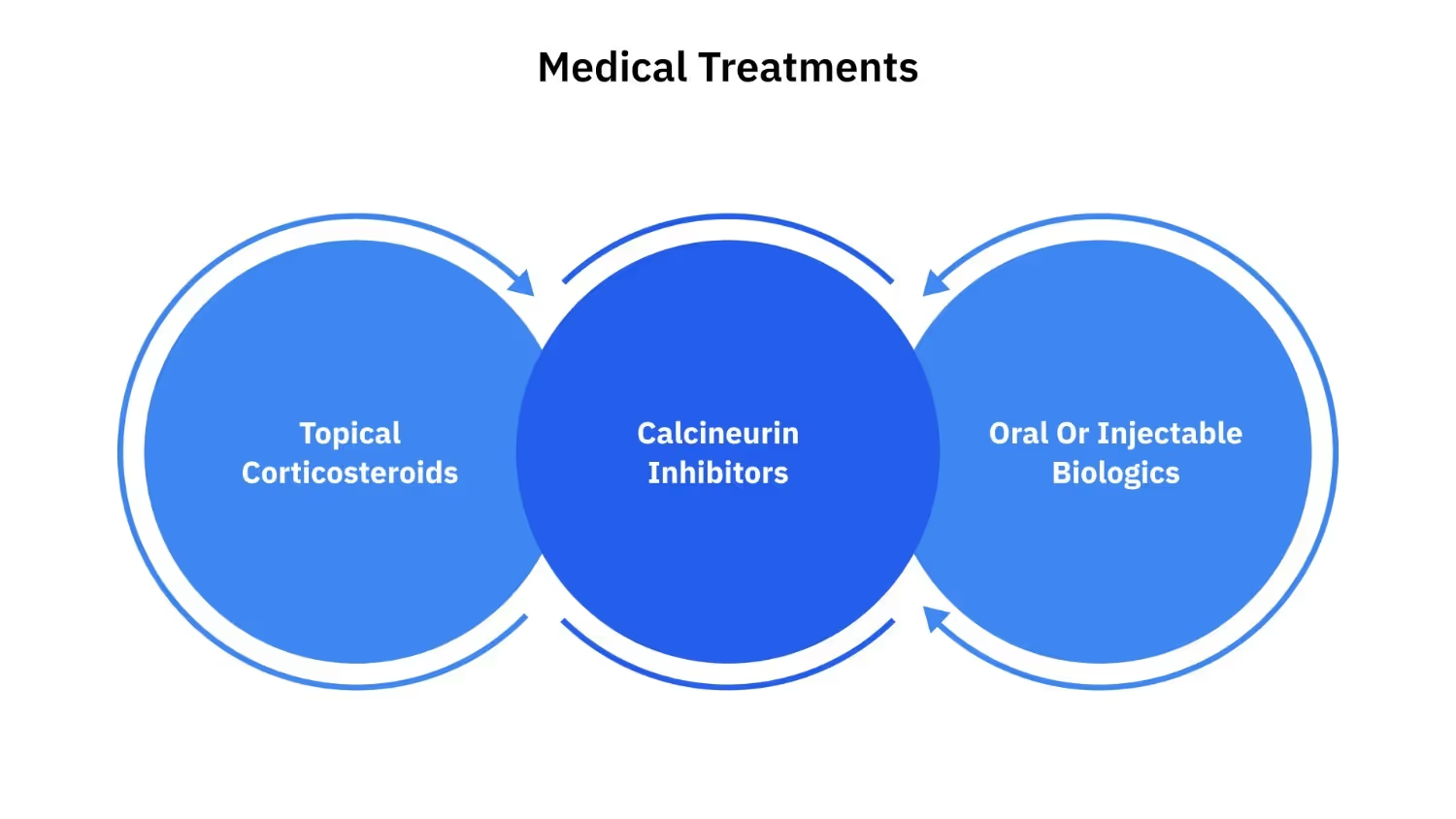
Medical therapies focus on reducing inflammation, soothing itching, and repairing the skin barrier during flare-ups or persistent symptoms:
1. Topical corticosteroids
These are anti-inflammatory creams or ointments prescribed to calm redness and itching. They come in different strengths, allowing your dermatologist to tailor treatment based on severity. Used correctly, they provide quick relief but should be monitored to avoid thinning of the skin with prolonged use.
2. Calcineurin inhibitors
As steroid alternatives, these creams or ointments suppress the immune system’s overactive response without the side effects linked to steroids. They’re often preferred for sensitive areas like the face or skin folds and for long-term maintenance.
3. Oral or injectable biologics
For moderate to severe eczema that doesn’t respond to topical treatments, newer biologic drugs target specific parts of the immune system, driving inflammation. These treatments require specialist supervision but have transformed outcomes for many patients by reducing symptoms and improving quality of life significantly.
B. Lifestyle & Home Remedies
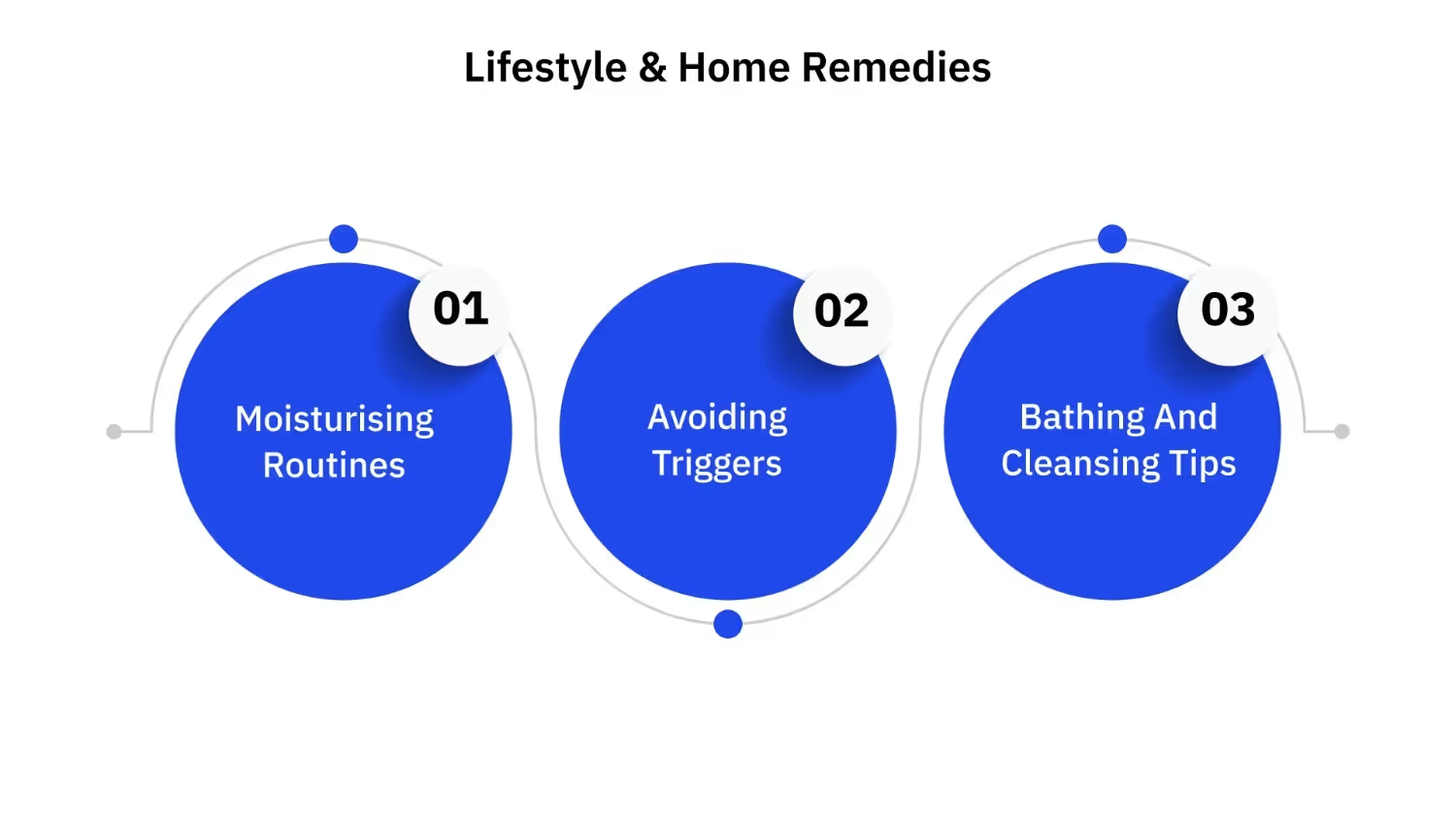
Everyday habits play a huge role in managing eczema. Alongside medical care, these steps can help maintain skin health and prevent flare-ups:
1. Moisturising routines
Consistent hydration is essential. Use thick, fragrance-free moisturisers or ointments multiple times a day, especially right after bathing, to lock in moisture and restore the skin’s barrier function. Avoid lotions that are too light or contain irritants like alcohol or perfume.
2. Avoiding triggers
Identifying what causes or worsens your eczema is key. Common irritants include harsh soaps, detergents, fragrances, certain fabrics like wool, and allergens such as dust mites or pollen. Keeping a symptom diary can help spot patterns and guide avoidance strategies.
3. Bathing and cleansing tips
Opt for short baths or showers using lukewarm water rather than hot, which can dry out skin further. Choose gentle, soap-free cleansers designed for sensitive skin. After bathing, gently pat your skin dry instead of rubbing and apply moisturiser immediately to seal in hydration.
Struggling to find the right treatment for your eczema? At Velantis Dermatolog, Dr. Janani Sree C M creates personalised care plans personalised to your skin’s unique needs. Book a consultation today to start your journey toward healthier skin.
Once eczema symptoms are under control, the next challenge is keeping flare-ups from coming back. This is where long-term management plays a crucial role.
Long-Term Management Strategies

Eczema thrives on inconsistency, so the more predictable your care, the better your skin will behave. A strong long-term plan combines preventive steps, daily skincare, and ongoing check-ins with your dermatologist.
1. Preventive care and flare-up control
Identify and avoid common triggers like harsh soaps, certain fabrics, or sudden weather changes. Keep your environment skin-friendly, a humidifier in dry climates and breathable fabrics year-round can help.
2. Building a skincare routine that works
Use gentle cleansers, fragrance-free moisturisers, and barrier creams regularly, even when your skin looks fine. Consistency is key to keeping inflammation at bay.
3. Importance of follow-up consultations
Eczema can change over time, so routine visits allow adjustments in medication strength, topical treatments, or lifestyle recommendations.
Conclusion
Eczema may be a long-term condition, but it doesn’t have to control your life. With a personalised treatment plan, proactive skin care, and regular medical guidance, flare-ups can be reduced in both severity and frequency. The key is to stay consistent, even when your skin feels healthy, to prevent sudden relapses.
Remember, your skin’s needs can change over time. If you notice new symptoms or your current plan isn’t as effective, consult your dermatologist promptly. Small adjustments can have a big impact on keeping your skin calm and comfortable.
Ready to take control of your eczema? Book your consultation with Velantis Dermatology today and receive a customised care plan tailored by Dr. Janani Sree C M to meet your needs.
FAQs
Q1. Is eczema contagious?
A1. No, eczema is not contagious. You cannot catch it from or pass it to someone else.
Q2. Can eczema be cured permanently?
A2. There is no permanent cure for eczema, but it can be managed effectively to reduce symptoms and flare-ups.
Q3. What foods should I avoid if I have eczema?
A3. Common triggers include dairy, eggs, soy, nuts, and wheat, but it varies for each person. An elimination diet or allergy testing can help identify your personal triggers.
Q4. Does stress make eczema worse?
A4. Yes, stress can trigger or worsen flare-ups in some individuals due to its effect on the immune system and skin inflammation.
Q5. Which moisturiser works best for eczema?
A5. Thick, fragrance-free creams or ointments are usually best. Look for products with ceramides, glycerin, or hyaluronic acid for long-lasting hydration.
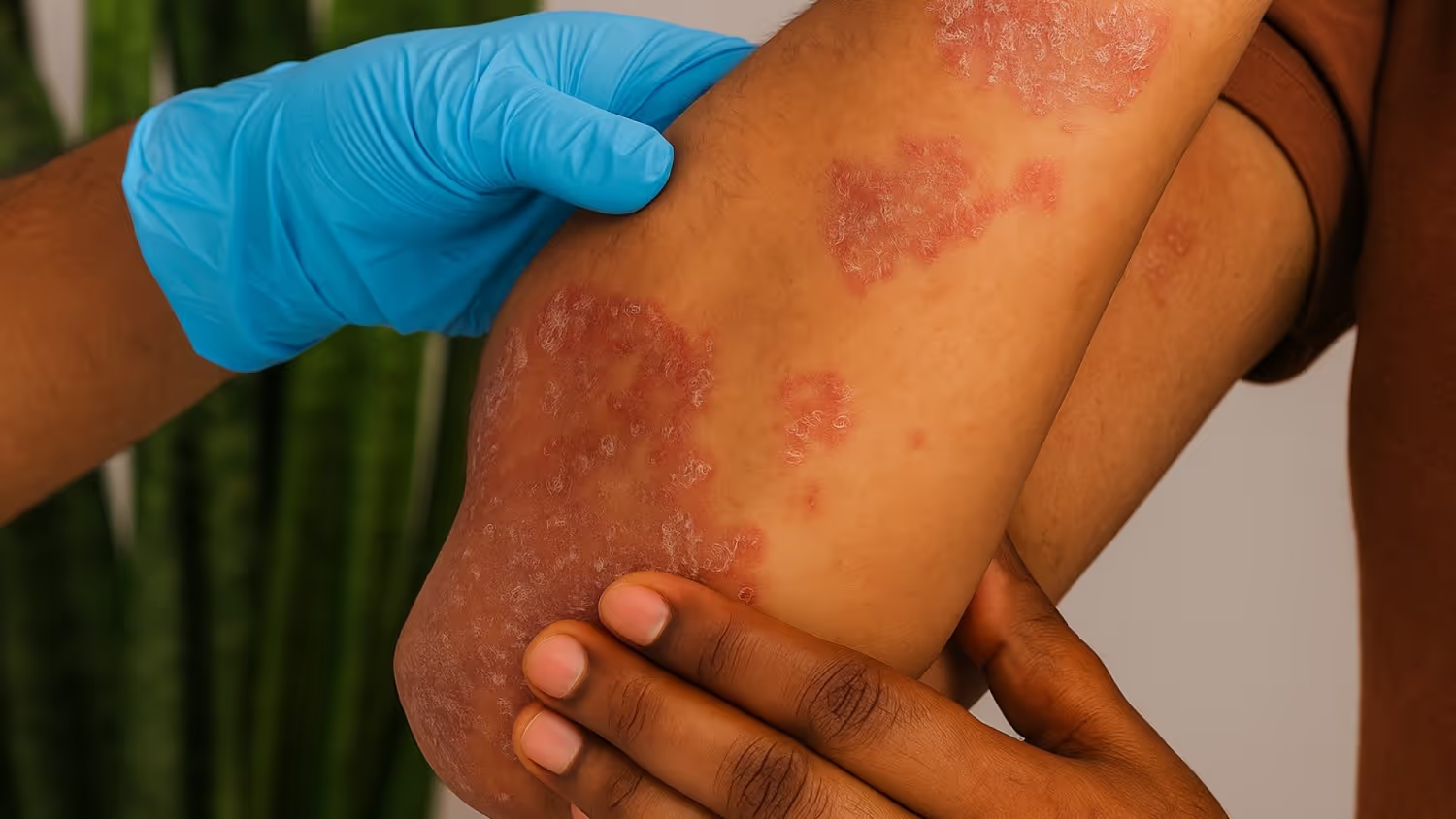

.png)
